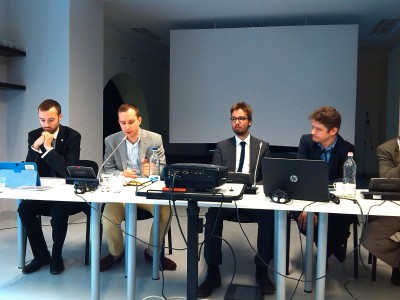
A threat is looming over Europe. At first glance the menace is two headed, internal and external but at closer inspection it is clear, there is one man behind both: Russia’s power hungry strongman, Vladimir Putin. With the ongoing war in Ukraine and the rise of the European far right which is sympathetic to the cause of Putin, the pro-liberty NGOs must act. Never before in the past decade has the need been so great for the civic movements to unite and respond to the threat from the East. To answer this need Free Market Foundation has organized an international conference in Budapest on June 22, titled “Europe vs Russia”. The event was supported by the Friedrich Naumann Foundation for Freedom and 4liberty.eu partners such as Republikon Institute and FOR.
The aim of the event was to analyze and discuss the current situation and to develop an ambitious common policy for pro-liberty think tanks. The illustrious speakers contributed valuable insights and contributed to creating a successful and interesting conference. Despite of the warm summer weather, the event was attended by a fair number of people and also received a favorable media presence.
The first guest speaker delivering the keynote address was Michel Kelly-Gagnon from the Montreal Economic Institute. He set the topic of Europe vs Russia into context by providing an objective view. He emphasized the importance of NGOs in resolving the crisis between Europe and Russia. NGOs can influence both the governments and the general population.
The next panel discussed the ways Ru ssia poses a threat to liberty. The speakers agreed that Putin is a menace to both Russia and Europe, but also concluded that an actual shooting war is unlikely. Speakers had various backgrounds so the panel was diverse and interesting. All panellists agreed that Putin supports far right parties in the EU to undermine the integrity of the continent so a stronger understanding amongst member states is needed to step up against the aggressor in unison. On the other hand, the EU needs criticism, so the cooperation of the people of Europe must be a grassroots movement.
ssia poses a threat to liberty. The speakers agreed that Putin is a menace to both Russia and Europe, but also concluded that an actual shooting war is unlikely. Speakers had various backgrounds so the panel was diverse and interesting. All panellists agreed that Putin supports far right parties in the EU to undermine the integrity of the continent so a stronger understanding amongst member states is needed to step up against the aggressor in unison. On the other hand, the EU needs criticism, so the cooperation of the people of Europe must be a grassroots movement.
Following the overview of the international situation, the second panel set the matters in Hungary into broader context. Speakers explained why the Hungarian government is strengthening ties with Russia while going against its western allies. Besides the lobby of Russia and corruption there are historical causes as well, but the most important reason is the undeniable populist nature of the governing party, Fidesz, in Hungary.
Finally, the last panel debated the role of NGOs in the recent crisis and sought to answer what think tanks can do. Speakers agreed that the role of think tanks is to influence the government directly and educate and incentives the people. The think tank leaders in the panel stressed the importance of free interaction between the Hungarian citizens as a way to facilitate peaceful relations.






















